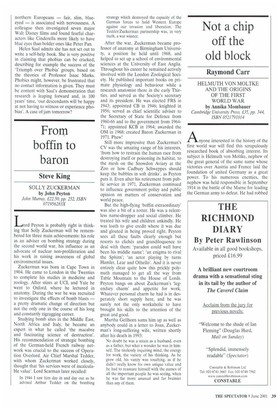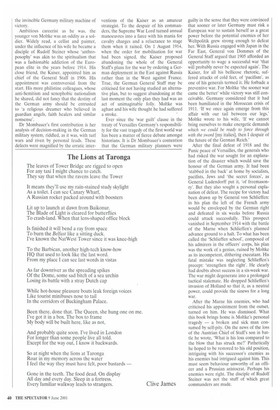Not a chip off the old block
Raymond Carr
HELMUTH VON MOLTICE AND THE ORIGINS OF THE FIRST WORLD WAR by Annika Mombauer Cambridge University Press, £35, pp. 344, ISBN 0521791014 Anyone interested in the history of the first world war will find this scrupulously researched book of absorbing interest. Its subject is Helmuth von Moltke, nephew of the great general of the same name whose victories over Austria and France laid the foundation of united Germany as a great power. To his numerous enemies, the nephew was held responsible in September 1914 in the battle of the Marne for leading the German army to defeat. He had robbed the invincible Germany military machine of victory
Ambitious careerist as he was, the younger von Moltke was an oddity as a soldier. Widely read, a cellist and painter, under the influence of his wife he became a disciple of Rudolf Steiner whose `anthroposophy' was akin to the spiritualism that was a fashionable addiction of the European elite in the years before 1914. His close friend, the Kaiser, appointed him as chief of the General Staff in 1906. His appointment was controversial from the start. His more philistine colleagues, whose anti-Semitism and xenophobic nationalism he shared, did not fancy that the destiny of the German army should be entrusted to 'a religious dreamer who believed in guardian angels, faith healers and similar nonsense'.
Dr Mombauer's first contribution is her analysis of decision-making in the German military system, riddled, as it was, with turf wars and riven by personal feuds. These defects were magnified by the erratic inter
ventions of the Kaiser as an amateur strategist. To the despair of his commanders, the Supreme War Lord turned annual manoeuvres into a farce with his mania for cavalry charges and a reluctance to stage them when it rained. On 1 August 1914, when the order for mobilisation for war had been signed, the Kaiser proposed abandoning the whole of the General Staffs plans for the war by ordering a German deployment in the East against Russia rather than in the West against France. True, the German General Staff may be criticised for nofhaving studied an alternative plan, but to suggest abandoning at the last moment the only plan they had was an act of unimaginable folly. Moltke was aghast and his wife thought he had suffered a stroke.
Ever since the 'war guilt' clause in the treaty of Versailles Germany's responsibility for the vast tragedy of the first world war has been a matter of fierce debate amongst historians. It is Dr Mombauees contention that the German military planners were
guilty in the sense that they were convinced that sooner or later Germany must risk a European war to sustain herself as a great power before the potential enemies of her Weltpolitik grew strong enough to defeat her. With Russia engaged with Japan in the Far East, General von Dommes of the General Staff argued that 1905 afforded an opportunity to wage a successful war 'that will probably never be expected again'. The Kaiser, for all his bellicose rhetoric, suffered attacks of cold feet, of 'pacifism', as one of his generals termed it. He forbade a preventive war. For Moltke the sooner war came the better' while victory was still conceivable. Germany considered that it had been humiliated in the Moroccan crisis of 1911. If we once again emerge from this affair with our tail between our legs,' Moltke wrote to his wife, 'If we cannot bring ourselves to make energetic demands which we could be ready to force through with the sword [my italics], then I despair of the future of the German Reich.'
After the final defeat of 1918 and the Punic peace of Versailles, the generals who had risked the war sought for an explanation of the disaster which would save the honour of the German army. It had been 'stabbed in the back' at home by socialists, pacifists, Jews and 'the secret forces', as General Ludendorff put it, 'of freemasonry'. But they also sought a personal explanation of defeat. The recipe for victory had been drawn up by General von Schlieffen: in his plan the left of the French army would be enveloped by the German right and defeated in six weeks before Russia could attack successfully. This prospect vanished in September 1914 with the battle of the Marne when Schlieffen's planned advance ground to a halt. To what has been called the 'Schlieffen school', composed of his admirers in the officers' corps, his plan was the work of a genius, ruined by Moltke as its incompetent, dithering executant. His fatal mistake was neglecting Schlieffen's precept: 'strengthen the right'. He clearly had doubts about success in a six-week war. The war might degenerate into a prolonged tactical stalemate. He dropped Schlieffen's invasion of Holland so that it, as a neutral power, could provide the sinews for a long war.
After the Marne his enemies, who had criticised his appointment from the outset, turned on him. He was dismissed. What this book brings home is Moltke's personal tragedy — a broken and sick man consumed by self-pity. On the news of the loss of the Austrian Chief of Staffs son in battle he wrote, 'What is his loss compared to the blow that has struck me?' Pathetically he hoped to be restored to his old position, intriguing with his successor's enemies as his enemies had intrigued against him. This must seem behaviour unworthy of an officer and a Prussian aristocrat. Perhaps his enemies were right. The disciple of Rudolf Steiner was not the stuff of which great commanders are made.



































































 Previous page
Previous page